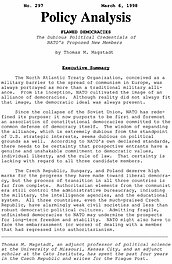Since the collapse of the Soviet Union, NATO has redefined its purpose: it now purports to be first and foremost an association of constitutional democracies committed to the common defense of democracy itself. The wisdom of expanding the alliance, which is extremely dubious from the standpoint of U.S. strategic interests, seems dubious on political grounds as well. According to NATO’s own declared standards, there needs to be certainty that prospective entrants have a genuine and unshakable commitment to democratic values, individual liberty, and the rule of law. That certainty is lacking with regard to all three candidate members.
The Czech Republic, Hungary, and Poland deserve high marks for the progress they have made toward liberal democracy, but the process of transition in all three countries is far from complete. Authoritarian elements from the communist era still control the administrative bureaucracy, including the military, the intelligence agencies, and the educational system. All three countries, even the much-praised Czech Republic, have alarmingly weak civil societies and less than robust democratic political cultures. Admitting fragile, unfinished democracies to NATO may undermine the prospects for long-term freedom and stability. NATO might also have to face the embarrassment (or worse) of dealing with a member that had regressed into authoritarianism.

